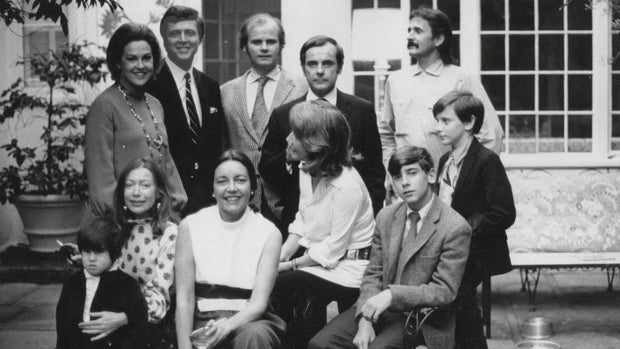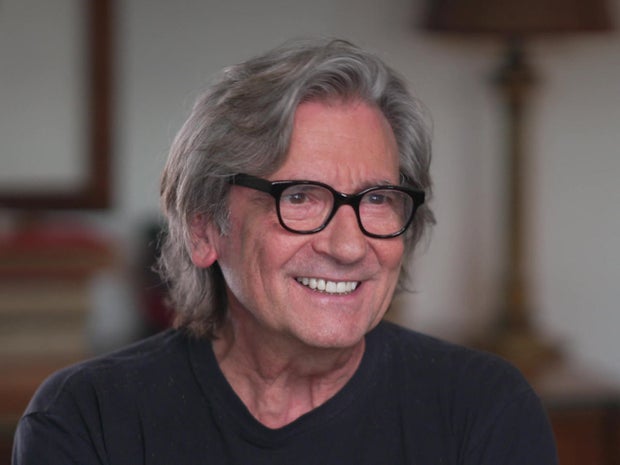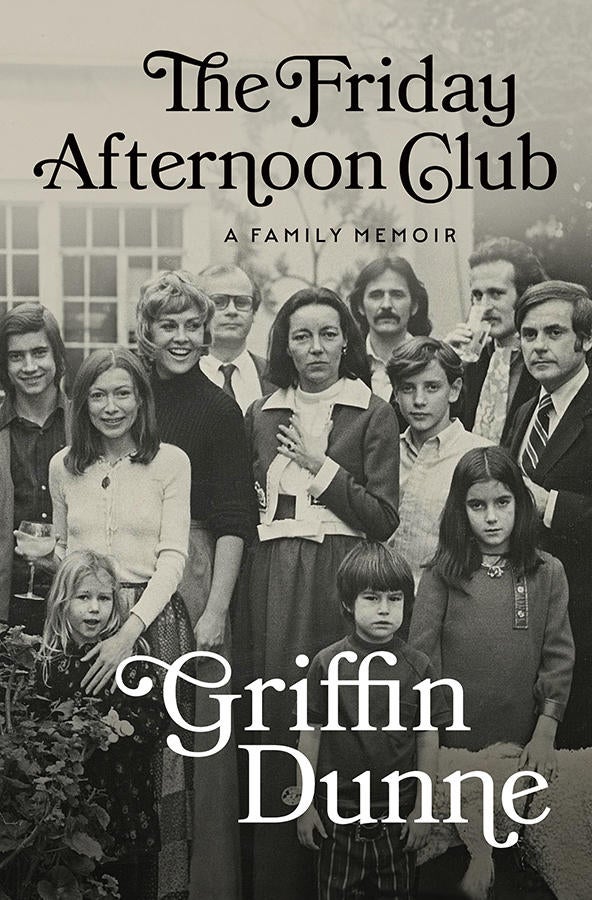“I would find myself telling stories,” said actor-producer-director Griffin Dunne. “And these stories were kind of incredible. And I had people riveted.”
And lot of the stories involved people that other people had heard of. “Yes,” he admitted. “But I didn’t want it to be, like, a name-dropping sort of thing!”
And there were a lot of names to drop.
Griffin Dunne grew up in California surrounded by the stories of his well-known literary family – his dad, Dominick Dunne; his uncle, John Gregory Dunne; and his aunt, Joan Didion, were all famous writers.
Penguin Press/McGrath Estate
The family fortune came from his mom, Ellen Griffin Dunne. “My great-great-great-grandfather (not sure how many greats were in there!) founded a company called the Griffin Wheel Company,” said Griffin. “It was an empire. Every train in America had a Griffin wheel.”
Griffin’s new book, “The Friday Afternoon Club” (to be published June 11 by Penguin Press), is about his family. It chronicles the good, the bad, and the excessive.
Griffin’s father’s kept meticulous scrapbooks, including one from his parents’ tenth anniversary. “There would be no eleventh,” Griffin said.
CBS News
Even though the hosts were on the brink of divorce, seemingly all of Hollywood turned out: Billy Wilder, Angela Lansbury, Dennis Hopper, David Niven, Angie Dickinson. “It was a very extravagant ball,” Griffin said. “At our house they put a hardwood floor over the pool for dancing.”
Too extravagant for Griffin and his younger siblings, Alex and Dominique. “They put my brother, sister, and I in our PJs and checked us into a hotel, for the night,” Griffin said. “Yeah. That’s how they rolled!”
But not for long. “When my parents got divorced, there were no more parties. My mother didn’t care about that stuff.”
By then, his father’s brother, John Gregory Dunne, and his wife, Joan Didion, were just up the coast in Malibu. They were at the epicenter of filmmaking in the ’70s, and hosted Hollywood’s new generation: Steven Spielberg, Martin Scorsese, Warren Beatty. “I was precocious enough to be invited to John and Joan’s parties,” said Griffin.
But Griffin dropped out of high school and headed East. “When I moved to New York, I was very – I don’t know, I guess embarrassed that I grew up in Beverly Hills,” he said. “I wanted to invent myself. I wanted to be a theater actor.”
He was a working actor, in a sense: “I was working at Radio City Music Hall as a popcorn concessionaire. There really is such a title! I had a paper hat, a little cadet paper hat!” he laughed.
Penguin Press
Soon, his best friend, Carrie Fisher, came from California with her mother, Debbie Reynolds, who was starring in a musical on Broadway. “Debbie summoned me and said, ‘My daughter wants to move to New York, but I’m not gonna let her live alone. You have to be her roommate.’ And so, we became roommates.”
He had a front-row seat for when Fisher made the decision to take a part in a movie about outer space. “She got this part in this movie, and she goes, ‘It’s ridiculous. But I gotta take it!'” Dunne said.
In 1977, “Star Wars” broke box office records. “It was like The Beatles came back to life or something,” said Dunne.
The film turned Carrie Fisher into a household name. Dunne said, “It’s a very particular thing when you have a best friend who becomes – suddenly, overnight – unbelievably famous. It’s also very tough when you are that person who becomes unbelievably famous.”
In 1981, Dunne starred in “An American Werewolf in London.” Dunne’s world was about to change, too, but in a very different way.
Griffin’s little sister, Dominique Dunne, also an actor (“Poltergeist”), was strangled by her ex-boyfriend in 1982. She was 22 years old. “My last phone call with her was, you know, I was on my way to a movie,” Griffin said. “And nothing was ever the same. We’d never known violence to come into our home like that. We’d never known loss, grief that immediate.”
Dominique’s killer was sentenced to six-and-a-half years in prison. Throughout the trial, Griffin was in the courtroom during the day, and on set at night, filming the mob comedy “Johnny Dangerously.” He said he was grateful to have a project like that to distract him.
He continued making movies, starring in “Who’s That Girl,” with Madonna, and “After Hours,” directed by Martin Scorsese.
In his book Dunne writes, “I was too young to understand gratitude for living the dream.”
He explained: “You kinda think, ‘Oh, this is gonna happen again. Let the offers come in.’ Some people just forget the hunger that got them there in the first place. And I think I had a touch of that.”
Starting in the ’90s, he directed a series of movies, including “Practical Magic.” More recently, he directed a documentary about his aunt, Joan Didion.
View a trailer for “Joan Didion: The Center Will Not Hold”:
Asked what he thinks about nepotism, Griffin Dunne replied, “It’s hard out there. If you’re good and you’re related to somebody famous, that does get you in the door.”
Sanneh asked, “But do you understand why some people are kind of bothered by that?”
“I understand why people would be,” said Dunne. “But I think it’s like, who wouldn’t wanna see Robert Downey? What if he felt like, Oh, don’t wanna cash in on my dad? We’d never get to see Robert Downey!”
At 69, Griffin Dunne, who once wanted to escape his family legacy, is now proud to be part of it.
Sanneh asked, “Do you still love show business?”
“Very much. Very much. I never, ever tired of show biz,” he replied.
Why? “I love show folks,” Dunne said. “And I’m always down for a good story.”
READ AN EXCERPT: “The Friday Afternoon Club: A Family Memoir” by Griffin Dunne
For more info:
Story produced by Mary Raffalli. Editor: George Pozderec.




